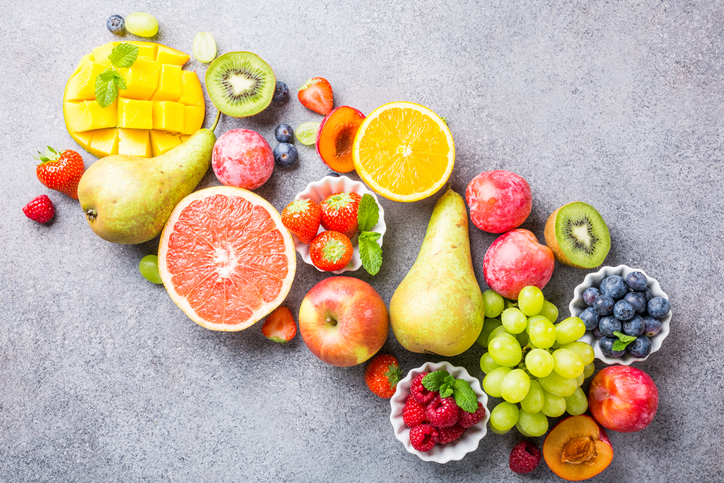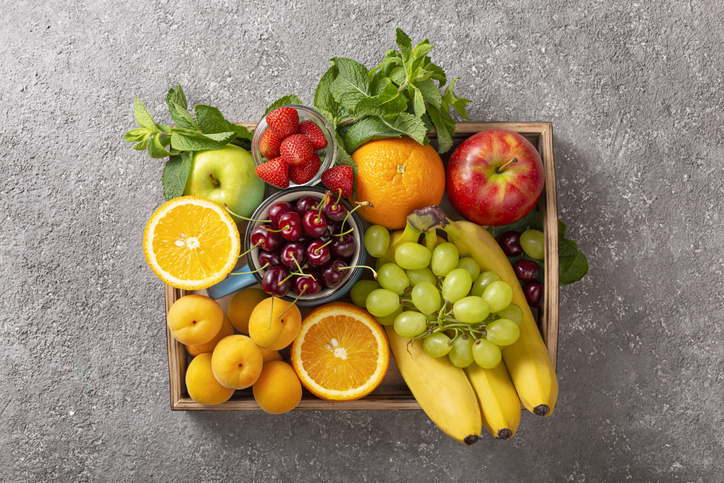One thing that almost every person on a weight-loss journey must have encountered is the relentless debate about sugar in fruits and their consumption. Should I eat that banana during a workout, or should I keep an apple for a quick healthy munch at work without disturbing my low-sugar diet? These are the most common questions that cross the mind of every person who is avoiding a sugar-laden diet.
However, the debate about consuming sugar importantly holds that fruits contain natural sugar. They are not considered fattening or threatening to increase our blood sugar levels. The nutritionists advocate new scientific discoveries in this regard, which assert that fruits are not fattening.
That being said, the medical professionals and nutritionists also claim that as anything excess is bad; therefore, a controlled quantity of fruits is not a threat to the weight-watchers. Rather, fruits in a limited and controlled amount significantly help in the weight-loss journey.
What about the sugar in fruits?

Sugar in fruits is in its most natural form. It is hugely different than our table or refined sugar. Refined sugar is processed, implying that it is taken from the sugar cane or beets to be processed into what we purchase from stores. Of course, processed sugar does not have any nutrition in it – except, well, sugar!
On the other hand, the sugar in fruits is known as fructose. Though by name, it is the same as refined or table sugar, it otherwise differs significantly from it. Firstly, the fructose in sugar is in its natural form. Secondly, this fructose is not supposed to be consumed alone; instead, the fiber in fruits helps dampen the effect of fructose. It is like a saving grace of the fruits from the harmful impacts of fructose.
How does our body react to added sugar vs natural sugar?
Consuming refined sugar, mostly in the form of table sugar, is readily absorbed by the liver. This results in a spike in blood sugar levels. Too much of the sugar content in our bloodstream then stimulates the release of a large quantity of insulin to help control the blood sugar levels.
This high quantity of insulin can bring down the spiked sugar levels in our blood. However, this takes our body to a hypoglycemic state (low sugar level) – which in turn leaves us in a starving state. This forces us to eat more and with fewer intermittent gaps.
In comparison, the sugar in fruits is combined with fiber and numerous other nutrients such as potassium, folate, vitamin B, etc. The fiber in fruits helps slow down the digestion process of fructose. The soluble part of the fiber forms a gel-like substance in the stomach, which decreases the speed of absorption of sugar in our bloodstream. Also, the phytonutrients in the fruits play an inhibiting role in sugar absorption through the stomach wall into the bloodstream.
How can you lose weight by consuming fruit?

Contrary to popular belief that fruits are packed with sugar, which is why they should be avoided when following a weight-loss diet, a registered dietician, Cynthia Sass, explains in her blog that fruits are not the culprit behind the obesity crisis in the USA.
She stresses the fact that, if not over consumed, fruits, even cherries, melon, berries, etc., can surprisingly help in losing weight. The following points elaborate on how consuming fruits might help in your weight loss journey rather than making you fat:
1. Consuming Fruits Makes You Eat Less
This is one of the most interesting pieces of evidence in support of the fact that fruits do not make you fat. Research conducted in 2014 revealed that people who are fruit-eaters have lower BMIs as compared to the ones who do not consume fruits. The research also deduced that the BMIs of fruit-eaters were also lower than the people who consume more veggies in their daily diet.
So, next time you shy away from a sweet thing while on a low-sugar diet, help yourself with an apple or fresh blueberries or a chunk of watermelon. Furthermore, consuming more produce than baked items is claimed to result in lower body fat and smaller waist measurements.
2. Fruits are loaded with Fiber
The impressive combination of varying proportions of different nutrients in fruits is mind-blowing. Fruits usually have high water and fiber content. Fiber, as elaborated above, helps significantly in dampening the effects of sugar in our bodies. It slows down the absorption of sugar, which in turn is imperative in reducing the chances of sudden spikes in our bloodstream.
Therefore, naturally occurring sugar (fructose) in fruits is less likely to make you fat than processed or added sugar. For instance, consuming a cup of fresh strawberries provides you with only 7 grams of sugar as compared to a tablespoon of maple syrup, which provides you with 13 grams of sugar.
3. Antioxidants in Fruits

Different fruits have varying amounts and kinds of antioxidants. Antioxidant properties of some fruits, such as cherries and plums, are slightly different than, say, berries, melon, citrus, or tropical fruits. Thus, maybe consuming the same type of fruit every day will not reap such benefits as consuming a different variety of fruits daily.
4. Fruits Provide Endurance and Energy Boost
Fruits are an excellent source of obtaining an instant boost of energy. Research comparing the consumption of bananas to drinking any sports drink during an intense cycling exercise, found that bananas not only provided an instant energy boost but also resulted in increased motivation. The research observed that the consumption of bananas resulted in a shift in dopamine – a neurotransmitter that is critical in elevating mood.
This critical finding implies that the consumption of fruits is not only beneficial for our physical health but also for uplifting our mental endurance.
5. Sugar found in fruit does not cause an insulin spike
According to food experts, fruits contain a large amount of fiber in them. This fiber is great at managing your blood sugar level and preventing it from spiking. A constant blood sugar level allows our bodies to respond to insulin better. With better insulin sensitivity, weight can be better managed.
Fruits such as berries are great at making sure that your blood sugar level does not spike irregularly.
FAQ- Do Fruits Make You Fat

1. Can fruit aid in weight loss?
Yes, fruits are well-known in the weight loss community as an excellent alternative to sweets and desserts to help shed off those pounds.
According to dieticians, a healthy diet has to have fruits. The reasoning behind this is that fruits contain a large amount of fiber and other vitamins that are essential for human functioning.
When trying to lose weight, fruits can be extremely helpful. They are generally low in calories but high in volume. Hence, when you consume fruit instead of other processed snacks, you feel full for longer.
Additionally, fruits also have a high fiber content which helps manage our blood sugar level. A managed blood sugar level allows our bodies to respond to insulin well. Good insulin sensitivity works wonders in managing our weight. If you have good insulin sensitivity, losing weight and keeping it off will be easier than ever.
However, it is important to note that eating fruit whole is better than drinking fruit juices. Juiced fruits often lose their fiber in the juicing process.
Do apples aid in losing fat?
Fruits in general are great for those who want to lower the fat content of their body. Apples in particular are very useful in reaching this goal. They contain a lot of fiber along with healthy flavonoids. Both of these work together to burn the excess fat that your body may be holding on you.
Furthermore, the fiber present in apples is pectin fiber. This kind of fiber breaks down slowly and allows you to feel full for longer. Additionally, apples are a way healthier snack than any processed snack on the market. They are low in calories which makes them a perfect fat burner fruit.
What fruits allow you to lose weight as you sleep?
Although fruits do not miraculously burn off all the fat you have, certain fruits are great at helping you along the journey towards health.
Cherries are one such fruit that is great for weight loss. Cherries when consumed at night can allow you many health benefits. Cherries are known to contain melatonin. Melatonin is a hormone that helps you sleep better which means that cherries might make your sleep a lot more restful.
A good night’s sleep is crucial when you are trying to lose weight hence, cherries are a great way to ensure both, a restful night and weight loss.
What fruits should you avoid when on a diet?
When you are on a diet, fruits may seem like the best way to get sugar, fiber, vitamins, and other health benefits in the lowest amount of calories. However, not all fruits should be consumed regularly when you are on a diet.
For example, Avocados should be consumed in moderation if you are trying to lose weight. This particular fruit is calorie-dense and contains a lot of healthy fats. Although fats are good for you, excess fats might go against your original goal.
Grapes are another fruit that is better avoided when trying to lose weight. They contain a high amount of sugar and fat which may not support weight loss if consumed in excess.
Dry fruits should also be avoided due to the high-fat content in them.
The Takeaway
So, what does this all mean? Does it imply that our weight-loss diet should majorly involve fruits and their consumption day and night? Absolutely not. A balanced diet helps in maintaining a healthy body, so does a carefully balanced consumption of fruits. Therefore, fruits, in no way, make you fat if eaten in moderation.

